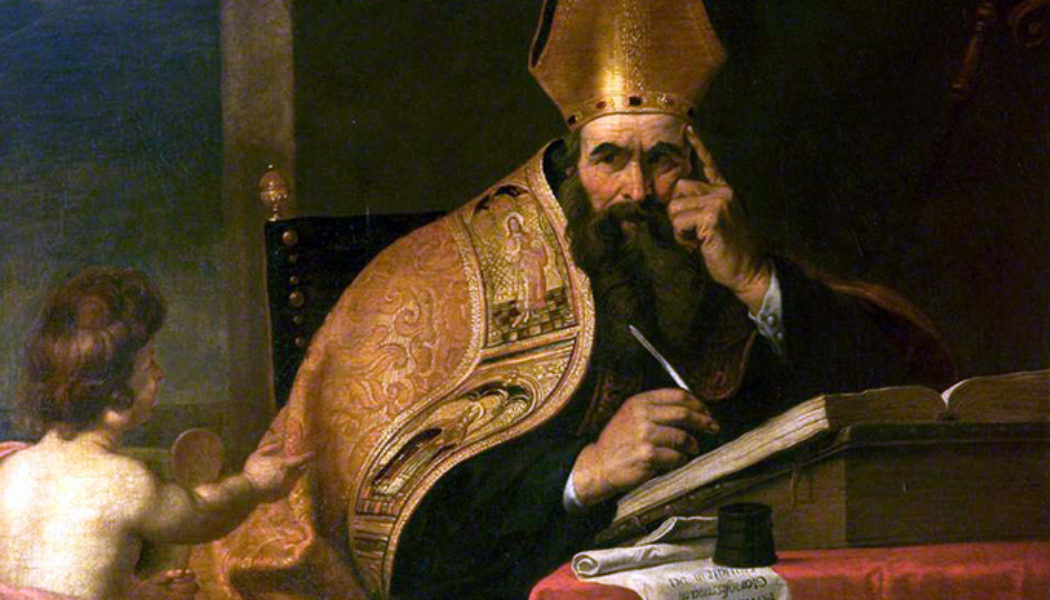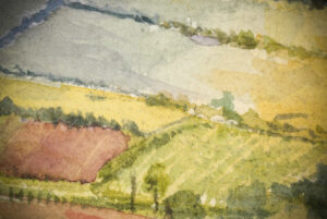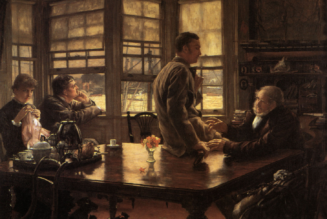
This letter is a feast of inspiration and beauty. What else would you expect from St. Augustine?
Around the beginning of the fifth century, there was an elderly widow named Proba. One day in Church she heard the passage from Romans which says that we do not know how we ought to pray (Romans 8:26). This was confusing to hear because she knew that she ought to pray and that dedicating herself to prayer was an important role she had to play as a widow in the Church. How was it that she was supposed to give herself to intercession and prayer if, according to the Bible, we do not know how we ought to pray?
So, she wrote a letter to her local bishop asking about this problem. His reply to her is the most amazing work on prayer I have ever read. It is inspirational and beautiful, and the author gets right to the heart of what true prayer is. The bishop’s name was Aurelius Augustinus. We know him simply as St. Augustine. Proba was blessed, indeed. Imagine asking St. Augustine to explain a vexing problem and getting a reply. How many theologians wish they could have done that? Proba, though, did not ask about a theological problem. She simply wanted to know how she could pray better, which is much more important. The letter bears the unassuming and less than glamorous title “Letter 130,” and it can be found here. It will be familiar to those who pray the daily Office of Readings.
I heartily recommend reading the whole thing for yourself, because no blog on Augustine can ever be better than Augustine. Therefore, I don’t apologize that so much of the rest of this blog is St. Augustine in his own words (translated into English, of course). I will quote a few of the passages that make my heart sing for joy when I read them.
St. Augustine explains that the word prayer does not simply mean speaking to God, though that is certainly one way to pray. Prayer, in its broadest sense, means desire:
What else is intended by the words of the apostle: ‘Pray without ceasing,’ than, ‘Desire without intermission, from Him who alone can give it, a happy life, which no life can be but that which is eternal?’ … We ought by cherishing holy desire to pray without ceasing. For to spend a long time in prayer is not, as some think, the same thing as to pray ‘with much speaking.’ Multiplied words are one thing, long-continued warmth of desire is another.
This passage also cleared up for me a question about which I had always wondered: how am I supposed to pray without ceasing? But since true prayer is desire, words are not necessary and sometimes even unproductive:
To use much speaking in prayer is to employ a superfluity of words in asking a necessary thing; but to prolong prayer is to have the heart throbbing with continued pious emotion towards Him to whom we pray. For in most cases prayer consists more in groaning than in speaking, in tears rather than in words.
And what is it that we desire? Happiness. Even the Ancient Greek Pagan philosophers recognized that happiness is man’s greatest good. Ancient Christians knew it came only from God himself:
A happy life is to be sought after, and this is to be asked from the Lord God. Many different answers have been given by many in discussing wherein true happiness consists; but why should we go to many teachers, or consider many answers to this question? It has been briefly and truly stated in the divine Scriptures, ‘Blessed is the people whose God is the Lord.’
We groan inwardly for nothing less than God himself. Whatever else we pray for, He is what we really want, whether we know it or not. But since none of us have ever experienced God himself, we do not really know what it is that we desire:
At the same time, because this blessing is nothing else than the ‘peace which passeth all understanding,’ even when we are asking it in our prayers, we know not what to pray for as we ought. For inasmuch as we cannot present it to our minds as it really is, we do not know it, but whatever image of it may be presented to our minds we reject, disown, and condemn; we know it is not what we are seeking, although we do not yet know enough to be able to define what we seek. There is therefore in us a certain learned ignorance, so to speak — an ignorance which we learn from that Spirit of God who helps our infirmities.
In summary, St. Augustine explains to Proba that prayer is the desire for a happy life which consists, in the end, of the possession of God himself, a state which we know about but do not know. Therefore, in a sense, we do not know what we pray for because we cannot present to our minds the thing that we truly desire. We pray for what we do not know by fanning into flame our desire for God.
Once again, I cannot recommend highly enough that you go and read the entire letter itself. It pained me, as I wrote this blog, to be able to quote so little. It is a feast of inspiration and beauty. What else would you expect from St. Augustine?
Join Our Telegram Group : Salvation & Prosperity








